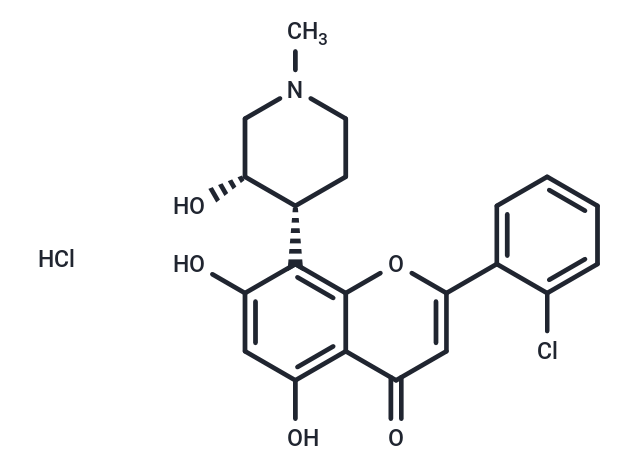Shopping Cart
- Remove All
 Your shopping cart is currently empty
Your shopping cart is currently empty

Flavopiridol hydrochloride (MDL 107826A) is a synthetic N-methylpiperidinyl chlorophenyl flavone compound. As an inhibitor of cyclin-dependent kinase, alvocidib induces cell cycle arrest by preventing phosphorylation of cyclin-dependent kinases (CDKs) and by down-regulating cyclin D1 and D3 expression, resulting in G1 cell cycle arrest and apoptosis. This agent is also a competitive inhibitor of adenosine triphosphate activity.

| Pack Size | Price | Availability | Quantity |
|---|---|---|---|
| 5 mg | $44 | In Stock | |
| 10 mg | $71 | In Stock | |
| 1 mL x 10 mM (in DMSO) | $48 | In Stock |
| Description | Flavopiridol hydrochloride (MDL 107826A) is a synthetic N-methylpiperidinyl chlorophenyl flavone compound. As an inhibitor of cyclin-dependent kinase, alvocidib induces cell cycle arrest by preventing phosphorylation of cyclin-dependent kinases (CDKs) and by down-regulating cyclin D1 and D3 expression, resulting in G1 cell cycle arrest and apoptosis. This agent is also a competitive inhibitor of adenosine triphosphate activity. |
| Targets&IC50 | CDK6:40 nM, CDK2:40 nM, CDK4:40 nM, CDK7:300 nM, CDK1:40 nM |
| In vitro | Intravenous administration of 7.5 mg/kg Flavopiridol in mice with the SUDHL-4 subcutaneously injected lymphoma model resulted in significant tumor reduction, with the majority (3/4) or complete disappearance (1/2) of tumors. Notably, two animals remained symptom-free for over 60 days, achieving an overall tumor growth delay of 73.2%. When administered orally at the maximum tolerable dose of 10 mg/kg Flavopiridol daily during days 1-4 and 7-11, the treatment contributed to tumor regression in PRXF1337 and sustained tumor stasis for four weeks in PRXF1369. Furthermore, continuous intravenous or intraperitoneal injection of 7.5 mg/kg Flavopiridol over five days led to complete tumor regression in 11 out of 12 late-stage subcutaneous (sc) human HL-60 xenografted mice, with the treated mice remaining disease-free for several months post-treatment. |
| In vivo | Flavopiridol induces G1 phase arrest and inhibits CDK2 and CDK4 in human breast cancer cells in a time- and concentration-dependent manner. A short-term treatment of approximately 12 hours with Flavopiridol triggers apoptosis in hematopoietic cell lines, including SUDHL4, SUDHL6 (B-cell lines), Jurkat, MOLT4 (T-cell lines), and HL60 (myeloid). Additionally, Flavopiridol treatment induces significant AKT-Ser473 phosphorylation in the human glioblastoma T98G cell line. In clonogenic assays, Flavopiridol demonstrates potent cytotoxicity across 23 human tumor models, with an average IC70 of 8 ng/mL. |
| Kinase Assay | Recombinant CDKs Kinase Reactions: CDKs activities are determined in microtiter plates as follows. Forty μg Gst-Rb are mixed with different amounts of Flavopiridol and unlabeled ATP. Reactions are then started by the addition of an ammonium sulfate cut of the S100 fraction obtained from insect cells expressing recombinant human CDKs. The final reaction conditions are 10 mM MgCl2, 50 mM Tris-HCl (pH 7.5), and 1 mM DTT. The final concentration of ATP is adjusted accordingly. Radiolabeled ATP is used as a phosphoryl donor. The reaction is carried out for 2.5 minutes at 30 °C after addition of enzyme and then terminated with the addition of EDTA. The Gst-Rb is then captured with glutathione-Sepharose and the incorporated radioactivity is determined by liquid scintillation counting. |
| Cell Research | Cells grown at a density of 1 × 106 cells/mL are exposed to Flavopiridol for different concentrations and time periods. DNA is extracted. Briefly, cells are washed once with cold phosphate-buffered saline (PBS) and lysed with 3 mL lysis buffer (5 mM Tris-HCL [pH 7.5]; 20 mM EDTA; 0.5% Triton X-100) for 15 minutes at 4 °C. The chromatin of the cell lysates is isolated by centrifugation (20 minutes at 26,000 g, 4 °C). The supernatants containing small DNA fragments are extracted sequentially with phenol, phenol:chloroform (1:1), and chloroform. Nucleic acids are precipitated in 0.5 M NaCl, 90% ethanol at -20 °C overnight. RNA is then digested by bovine RNAaseA (60 μg/mL). After sequential reextraction and reprecipitation, DNA is dissolved in 10 mM Tris-HCL (pH 7.5), 1 mM EDTA, 0.5% sodium dodecyl sulfate (SDS) before electrophoresis on 1.6% agarose gel. (Only for Reference) |
| Alias | NSC 649890 HCl, NSC 649890, MDL 107826A, HL 275, FLAVOPIRIDOL HCL, Alvocidib Hydrochloride |
| Molecular Weight | 438.3 |
| Formula | C21H21Cl2NO5 |
| Cas No. | 131740-09-5 |
| Smiles | Cl.CN1CC[C@@H]([C@H](O)C1)c1c(O)cc(O)c2c1oc(cc2=O)-c1ccccc1Cl |
| Relative Density. | no data available |
| Storage | Powder: -20°C for 3 years | In solvent: -80°C for 1 year | Shipping with blue ice. | ||||||||||||||||||||||||||||||
| Solubility Information | H2O: 43.8 mg/mL (99.93 mM), Sonication is recommended. DMSO: 43.8 mg/mL (99.93 mM), Sonication is recommended. | ||||||||||||||||||||||||||||||
Solution Preparation Table | |||||||||||||||||||||||||||||||
H2O/DMSO
| |||||||||||||||||||||||||||||||

Copyright © 2015-2025 TargetMol Chemicals Inc. All Rights Reserved.